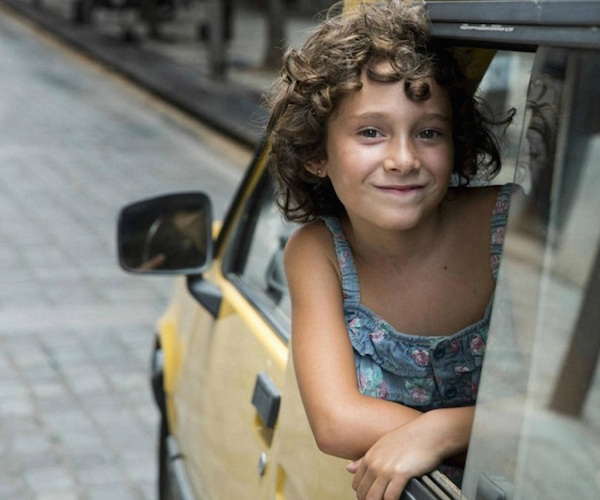Film Review: “Summer 1993” — Stolen Childhood
Summer 1993 is provocative, both for the raw depth of the emotions it evokes and the directness of its storytelling.
Summer 1993, directed by Carla Simón. Screening at Kendall Square Cinema.

Laia Artigas in a scene from “Summer 1993.”
By Peg Aloi
In this thoughtful postcard to the not-too-distant past, filmmaker Carla Simón dramatizes a young girl’s adjustment to a world without her mother. Autobiographical in origin, Summer 1993/Estiu 1993 is a moving, compelling, and simply told story of childhood and belonging. Frida (Laia Artigas) is six years old and, as the film begins, she is leaving Barcelona, sent to live in the countryside with her Aunt Marga, Uncle Esteve, and their young daughter Anna. Frida is at first shy and distant, hesitant in a new environment with people she barely knows. Her guardians treat her with kid gloves because of her recent loss. We gradually learn Frida’s mother died from AIDS, although this term is never uttered and the tip-toeing around the subject is quite fascinating.
Many would see Frida’s new living situation in Catalonia as charming and bucolic, an ideal setting for a rich childhood. It’s a small self-sustaining farm full of tantalizing places for kids to play. But Frida is from the city, and doesn’t appreciate the charms of home grown vegetables and wandering livestock. Her disorientation reads as boredom, and she begins to act out in subtle but ultimately serious ways, particularly as she leads the friendly three year old Anna around. Their antics are cute, but Frida doesn’t consider the danger of expecting a younger, smaller child to do the things that she does: Frida puts Anna at risk without meaning to. Her aunt and uncle become angry about Frida’s recklessness, and begin to wonder if they’ve made the right decision by taking her in. Meanwhile, Frida’s huge watchful eyes and poker face seem to be absorbing the world around her, though she behaves as if she doesn’t want to learn or belong. If not for our knowledge of her recent trauma, there would almost be a sense that she’s ‘a bad seed.’ Her willful misbehavior is that troubling.
At the local playground, Frida is the subject of whispered gossip among other parents, who tell their kids to stay away from her. Rumors about the cause of Frida’s mother’s death generate stigma and that affects the girl’s ability to integrate fully into a new community. Several children decide to try and include Frida in their games, but her diffident manner makes it hard for her to make friends. In addition, Frida has to go for frequent medical tests, though she takes them in stride. We see Frida’s new life through her eyes; despite noticing everything, she seems to feel very little in the way of joy.
One night, after a particularly harrowing day, Frida’s Aunt Marga is tempted to strike out in anger. It seems her patience may be pushed to the point that she will look for a new place for her niece to live. But, instead of acting on her frustration, she embraces and embraces Frida. It is a powerful expression of what has been missing in Frida’s life — acceptance and love. It is a turning point in the narrative, signaling a transformation in Frida’s lonely existence.
Time passes. Frida has adjusted to her new school and is asked to participate in the performance of the “big heads” at a festival. This odd, surreal, and rather funny ritual (kids wear giant papier-mache heads) appears to be a competitive treat for the children. It is an honor to be chosen to wear one of the “big heads.” Frida may at last be experiencing a happy childhood; but the film’s ending is a troubling reminder that the sudden loss of a parent is a terrifying and soul-crushing experience that endures.
Summer 1993 is provocative, both for the raw depth of the emotions it evokes and the directness of its storytelling. Its use of music is effective without being intrusive. As Frida, Laia Artigas is astonishingly good. Her performance is natural and appealing, providing flickers of wonder and laughter as her character grapples with grief, anger, and loss.
Peg Aloi is a former film critic for The Boston Phoenix. She taught film and TV studies for ten years at Emerson College, and currently teaches at SUNY New Paltz. Her reviews also appear regularly online for The Orlando Weekly, Cinemazine, and Diabolique. Her long-running media blog “The Witching Hour” can be found at themediawitch.com

I missed this one. Thanks for the nice summary and review and for keeping eyes out for these wonderful indie films too infrequently covered.